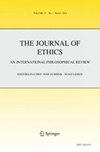Employers have a Duty of Beneficence to Design for Meaningful Work: A General Argument and Logistics Warehouses as a Case Study
IF 0.8
Q3 ETHICS
引用次数: 0
Abstract
Abstract Artificial intelligence-driven technology increasingly shapes work practices and, accordingly, employees’ opportunities for meaningful work (MW). In our paper, we identify five dimensions of MW: pursuing a purpose, social relationships, exercising skills and self-development, autonomy, self-esteem and recognition. Because MW is an important good, lacking opportunities for MW is a serious disadvantage. Therefore, we need to know to what extent employers have a duty to provide this good to their employees. We hold that employers have a duty of beneficence to design for opportunities for MW when implementing AI-technology in the workplace. We argue that this duty of beneficence is supported by the three major ethical theories, namely, Kantian ethics, consequentialism, and virtue ethics. We defend this duty against two objections, including the view that it is incompatible with the shareholder theory of the firm. We then employ the five dimensions of MW as our analytical lens to investigate how AI-based technological innovation in logistic warehouses has an impact, both positively and negatively, on MW, and illustrate that design for MW is feasible. We further support this practical feasibility with the help of insights from organizational psychology. We end by discussing how AI-based technology has an impact both on meaningful work (often seen as an aspirational goal) and decent work (generally seen as a matter of justice). Accordingly, ethical reflection on meaningful and decent work should become more integrated to do justice to how AI-technology inevitably shapes both simultaneously.雇主有义务为有意义的工作而设计:一个一般性的论点和以物流仓库为例的研究
人工智能驱动的技术越来越多地影响着工作实践,相应地,也影响着员工从事有意义工作(MW)的机会。在我们的论文中,我们确定了五个维度:追求目标、社会关系、锻炼技能和自我发展、自主性、自尊和认可。因为MW是一种重要的商品,缺乏MW的机会是一个严重的劣势。因此,我们需要知道雇主在多大程度上有义务向员工提供这种商品。我们认为,在工作场所实施人工智能技术时,雇主有责任为MW设计机会。我们认为,这一善行义务得到了三大伦理理论的支持,即康德伦理学、结果主义和美德伦理学。我们反对两种反对意见来捍卫这一义务,其中一种观点认为它与公司的股东理论不相容。然后,我们采用智能仓库的五个维度作为分析视角,研究基于人工智能的物流仓库技术创新如何对智能仓库产生积极和消极的影响,并说明智能仓库的设计是可行的。我们借助组织心理学的见解进一步支持这一实际可行性。最后,我们讨论了基于人工智能的技术如何对有意义的工作(通常被视为一个理想的目标)和体面的工作(通常被视为正义的问题)产生影响。因此,对有意义和体面工作的道德反思应该更加整合,以公正地对待人工智能技术如何不可避免地同时塑造这两者。
本文章由计算机程序翻译,如有差异,请以英文原文为准。
求助全文
约1分钟内获得全文
求助全文
来源期刊

Journal of Ethics
Arts and Humanities-Philosophy
CiteScore
1.50
自引率
0.00%
发文量
21
期刊介绍:
The Journal of Ethics: An International Philosophical Review seeks to publish articles on a wide range of topics in ethics, philosophically construed, including such areas as ethical theory, social, political, and legal philosophy, applied ethics, meta-ethics, the metaphysics of morality, and the history of ethics. The Journal of Ethics publishes work from a wide variety of styles including but not limited to the analytic tradition and hermeneutics. The Journal of Ethics is also interested in ethical thinking that is enriched by psychology, sociology and other empirical disciplines. The Journal of Ethics is primarily an organ of philosophical research, although it publishes work on topics of concern to academics and professionals alike. The journal also seeks to publish the highest quality commentaries on works published in its pages. Its double-blind review process must ensure analytical acuity as well as depth and range of philosophical scholarship.
At the moment, the journal does not publish book reviews.
 求助内容:
求助内容: 应助结果提醒方式:
应助结果提醒方式:


